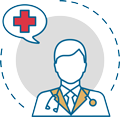Cancer of the mouth
"The key to fighting mouth cancer is prevention, early diagnosis and a multidisciplinary approach"
DR. JUAN MANUEL ALCALDE
SPECIALIST. OTORHINOLARYNGOLOGY DEPARTMENT

Cancer of the mouth, tongue and lips constitutes 5-8% of all cancers in the body. It mainly affects male smokers between the ages of 45-65.
The most frequent location is on the mobile tongue and shows a tendency to locally invade neighboring structures. It can produce metastasis in the lymph nodes of the neck.
At the Clinic you will be treated by a team consisting of all the specialists involved in the care of a patient with oral or facial cancer.
We perform an intraoperative assessment of the margins, in collaboration with the Department of Pathological Anatomy to achieve maximum removal of the cancer during surgery.
In addition, we perform immediate reconstruction in collaboration with the Plastic Surgery and Otolaryngology Departments to minimize the physical impact that this type of tumor entails.
We start the radiotherapy treatment in the same intervention (brachytherapy catheters) in collaboration with the Radiation Oncology Department to start the treatment as soon as possible with the least number of sessions necessary and less side effects for the patient.

A PERSONALIZED MEDICINE
Second Opinion,
peace of mind
Request a second opinion from our professionals with great experience in the diagnosis and treatment of oncological diseases
In 3 days, without leaving home.
Or if you prefer you can come to the Clinica.
Symptoms of mouth cancer
Most oral cancers can be detected with the naked eye. The most common symptoms include:
- Whitish and/or bleeding lesion in the mouth that does not heal after two or more weeks.
- White or red spots on the lining of the mouth, tongue, gums or tonsils.
- Lumps or thickening in the cheek, neck or any other part of the mouth.
- Persistent pain or constant discomfort in the mouth or when swallowing.
- Voice changes, such as hoarseness or slurred speech.
- Numbness or loss of feeling in the tongue or other areas of the mouth.
- Loose teeth or pain in the jaw.
- Unexplained bleeding in the mouth.
- Persistent bad breath despite good oral hygiene.
- Sudden difficulty or discomfort with dentures.
Do you have any of these symptoms?
If you suspect that you have any of the above symptoms,
you should consult a medical specialist for a diagnosis.
Types of mouth cancer
There are different types of mouth cancer, which vary in their presentation and management. These include salivary gland tumours, melanomas and sarcomas. The most common type is squamous cell or squamous epidermoid carcinoma.
Within this group, verrucous carcinoma, which accounts for less than 5% of cases, is a low-grade subtype that grows slowly and rarely spreads to other parts of the body, although it may invade nearby tissues.
Risk factors for oral cancer
The main risk factors for the development of oral cancer are:
- Tobacco and alcohol use
- Excessive local pressure from poorly fitted teeth or dentures
- Poor oral hygiene
- Prolonged unprotected exposure to the sun
- Chronic infections
How is mouth cancer diagnosed?
Diagnosis is based on a detailed physical examination complemented by imaging tests such as MRI, CT, PET or ultrasound.
A biopsy and sentinel lymph node study is also performed to assess lymph node involvement and determine whether the cancer has spread. Accurate diagnosis is key to proper treatment planning.
How is mouth cancer treated?
The treatment, which must be multidisciplinary, combines surgery, radiotherapy and chemotherapy. When carried out correctly, the cure rate is high.
- Radiotherapy: Starting radiotherapy treatment early after surgery, using state-of-the-art equipment such as brachytherapy, improves results and minimises risks.
- Prevention of complications: It is essential to treat any dental pathology before starting radiotherapy to prevent problems such as radionecrosis.
During surgery, the surgeon must be aware of the state of the tumour margins and the presence of affected lymph nodes to ensure an effective intervention.
Reconstruction is essential to restore the patient's quality of life. Advanced techniques are used, from microsurgery with grafts to bone transport or dental implants.
At the Clínica Universidad de Navarra, these reconstructions are performed immediately, in collaboration with the Departments of Plastic Surgery and Otorhinolaryngology.
The Head and Neck Cancer Area
of the Cancer Center Clínica Universidad de Navarra
In the Head and Neck Cancer Area we have a multidisciplinary approach, with all the professionals involved in the diagnosis, treatment and care of patients with head and neck tumors in order to offer the best possible treatment.
We have a unit specialized in oncological and reconstructive surgery of the head and neck. We are committed to minimally invasive endoscopic techniques and we are pioneers in the use of robotic surgery to perform more precise surgeries and minimize complications that may arise.
What diseases do we treat?
- Mouth cancer
- Laryngeal cancer
- Cáncer de orofaringe
- Tumor de nasofaringe
- Head and neck tumors
- Salivary gland tumors
- Tongue tumors

Why at the Clinica?
- Integral evaluation of the patient.
- Cutting edge technology.
- Expert professionals who are a national reference.
Our team of experts in oral cancer
Learn all about cancer and its latest treatments
‘The present and future of cancer treatment is based on highly specialised teams’
Dr. Antonio González, director of the Cancer Center of the Clínica Universidad de Navarra, summarises what cancer is, causes, diagnosis, treatment and innovative advances in the future of cancer treatment.




































